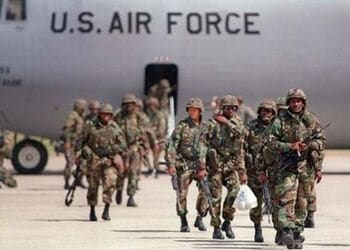The decision to send US troops into Colombia to help against drug trafficking is a troubling one, whether as part of the two countries’ security strategy or connected to broader efforts against Venezuela.
On May 28, the US Southern Command (SOUTHCOM) issued a statement that its 1st Security Force Assistance Brigade (SFAB) would support “enhanced counter-narcotics cooperation” in Colombia with no limit set on its deployment.
The head of Colombia’s armed forces, Gen. Luis Fernando Navarro, later added some details about the anti-drug mission. According to El Tiempo, he stated the SFAB troops would be in Colombia for four months, providing “tactical” advice to “improve operations against drug trafficking.”
SEE ALSO: Colombia News and Profiles
These troops will provide support in areas across Colombia high in coca production and drug trafficking, including Bajo Cauca, the south of Córdoba, Catatumbo, Arauca, the Pacific Coast of Nariño and the national parks of Chiribiquete, Sierra de La Macarena, Catatumbo Barí, Nudo de Paramillo and Sanquianga.
Opposition politicians were quick to warn that the move may be an unsubtle way to ramp up pressure on Venezuela.
On June 2, Colombia’s Common Alternative Revolutionary Force (Fuerza Alternativa Revolucionaria del Común – FARC) said on Twitter that the United States was not trying to “fight drug trafficking” but “coming to start a regional war.” The FARC political party was created after the demobilization of the Revolutionary Armed Forces of Colombia (Fuerzas Armadas Revolucionarias de Colombia – FARC) in 2016.
This is not the first time US troops have been deployed in Colombia. As part of Plan Colombia (2000-2014), a US-funded plan to help fight criminal groups and armed insurgents, American soldiers provided military training, intelligence support and tactical support during operations.
InSight Crime Analysis
The deployment of US troops to help in Colombia’s fight against drug trafficking is controversial for two reasons, quite apart from any potential links to Venezuela.
First, their arrival is seen as yet more evidence of pressure from the White House for Colombia’s President Iván Duque to provide results. Both governments have largely measured the success of anti-drug trafficking operations on the eradication of coca, an area in which Colombia has fallen behind this year.
President Donald Trump has not been shy about airing his discontent at Colombia’s strategies against drug trafficking, telling reporters that Duque “has done nothing for us” in March 2019.
SEE ALSO: Glyphosate Alone Won’t Fix Colombia’s Complex Coca Woes
There is also concern that these hardline methods will inevitably lead to the return of aerial spraying of the controversial herbicide glyphosate. Its use to destroy coca plants has been suspended since 2015 after it was linked to health problems in people — but Trump is a known supporter of this method.
The second is that this deployment has reportedly been carried out without the approval of Colombia’s congress. Lidio García, the president of the Colombian Senate, wrote on Twitter that the decision to allow foreign troops into Colombia was a constitutional prerogative of the Senate.
And while military officials in both countries made no mention of Venezuela — neither the SOUTHCOM statement nor Gen. Navarro named the country in reference to the SFAB’s role in Colombia — the move cannot be taken in isolation.
The deployment comes amid a campaign of military pressure from the White House against both Venezuela and drug traffickers. In April, SOUTHCOM deployed naval warships to the Caribbean, specifically to target “narcotraffickers who work in and out of Venezuela.”
Sergio Guzmán, director of the advisory firm Colombia Risk Analysis, told Business Insider that “that the fanfare and the timing of the announcement suggest that although their stated goal is anti-narcotics, the intent may be different.”
The SFAB troops are currently beginning a two-week quarantine, due to Colombia’s response to the coronavirus. It will be crucial to see how they are deployed once they leave isolation but for the moment, it is unclear how they would be a threat to Venezuela.

